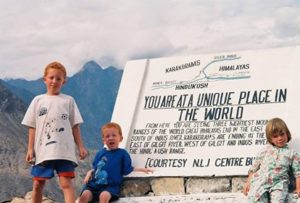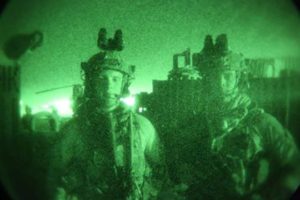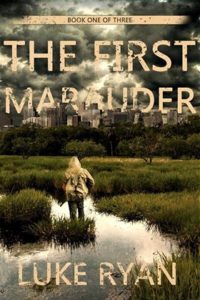Author Luke Ryan

Feel free to share a little about yourself in your own words.
My name is Luke Ryan, and although I was born in a small town in Michigan, when I was three years old my family moved to a small, rural town in Pakistan. My father is a doctor and mother a nurse, and they became aid workers in some of the harder parts of the world.

I lived in Pakistan for about nine years, and it was great. However, after 9/11, things started to get dangerous — when I was in 8th grade, the British school I attended was attacked by terrorists in what was essentially a school shooting. Six staff members were killed, and it was a miracle that all of the students survived.
This was a sign for us, and we left. We moved to Thailand, and my father began his work next door in Burma (Myanmar) in the warzone there, while we lived in the safety of Chiang Mai. Since then I have been to those conflict areas twice with him.
Once I finished high school, I returned to my home country the U.S. I had been there often and been somewhat infatuated with American fiction (mostly movies), so I wasn’t a stranger. Most people couldn’t guess that I grew up overseas unless they asked me about early 90s TV shows or specific pop culture references like that.
After a couple of years of figuring out what I wanted to do, I joined the U.S. Army. Eventually I became an Army Ranger, assigned to the 3rd Ranger Battalion, and I went on four combat deployments to Afghanistan, conducting well over 100 combat missions. One of those deployments was only 300 miles from Gilgit, a town in Pakistan in which I had spent five years.
I knew who the Taliban were growing up, and was glad to be a part of the fight against them — however, war doesn’t usually wind up how you think it will. On top of my childhood experiences, I definitely had the regular American young man’s thirst for adventure, so that was a big factor. I also grew up always appreciating American values, especially when they were absent in the places I was living. To me, those were worth fighting for.
I left 3rd Ranger Battalion as a Team Leader, and after about a year of being a nomad, I settled down in Tampa, FL where I earned my bachelor’s degree in English Literature. Now I live in Endicott, upstate NY, with my weird but awesome dog and near my wonderful girlfriend.

How did you get into writing?
I remember writing a “book” about Boba Fett when I was very, very young, in Pakistan when electricity was scarce. I had seen Star Wars and absolutely loved it. From there, I just kept writing. Throughout middle school, high school (both in international schools), the military and especially on deployments, and afterward — I always wrote. Sometimes it was short stories, sometimes longer fiction, sometimes screenplays… I never had any innate talent, but I love honing the craft and making my work as compelling and entertaining as possible.
What can you tell us about your daily routines that help you focus and your creative habits? So, for example how do you come up with some of your ideas and inspiration for your book?
I write for an online publication now for a living, so in order to keep my job I have to “write every day” like many suggest. This helps my craft immensely, but it’s hard to sit there and write 1000 or 2000 words every single day, and then turn around and work on my book on that same day. I get taxed easily.
With that said, I just do it anyway. I’ve always had a creative mind, but the military instilled within me a discipline that — when combined with my creativity — has allowed me to put work into my aspirations regardless of how I’m feeling that day.
As for inspiration — Hemingway is a huge one for me. His work is inspiring, sure, but I’m referring more to his method. As I learnt from my studies in college, Hemingway based many of his novels on his own life. For Whom the Bell Tolls is based on his experiences in the Spanish Civil War — it’s rife with things that “you just can’t make up,” as they say. The same goes for Stephen Crane, Walt Whitman with his poetry, and even C.S. Lewis and J.R.R. Tolkien, as I have studied them all.
Similarly, I strive to siphon my experiences into my work. I was in a school shooting as a child, but also in combat in Afghanistan as a trained adult among some of the most trained operatives in the world. Living permanently as a foreigner in a third world country, living in Arkansas and then San Francisco in the U.S. during politically tumultuous times — these are all things that fuel my fiction.
The First Marauder is one attempt at describing just what that feels like, in the fantastical context of post-apocalyptic fiction.
So to answer your question clearly: I draw inspiration from my own life. But it’s funny, the greatest moments in my book (according to my beta readers) have been the small moments. The moments about a dog who died, or a girl who just doesn’t understand the ramblings of a teenage boy. These are the moments people really resonate with, and I love that.
Is this book very personal for you? If so, how?
It’s definitely a personal book, and I think all of my books will be. It gets into not only how I feel about combat (which I have experienced on many levels), but how I feel about politics, individuality, and even being an awkward teenager. I came home from my 4th deployment to Afghanistan, feeling like I was in my mid-30s or 40s in many ways, but when it came to speaking with women at a bar, I might as well have still been barely 21, or even younger (in maturity level). That discrepancy is interesting to me now. Very personal, even embarrassing moments like this, are rooted into my book. I really feel that writing fiction is both cathartic and truthful to myself and (I hope) to my readers.
The First Marauder

How did you come up with the book title?
Well, the title is first and foremost plot-driven. However, “Maruader” is a word deeply rooted in U.S. Army Ranger lore (in real life), and that’s definitely where the inspiration for the name came from. The name “Merrill’s Marauders” is known by every Ranger who has served in the Army.
Plot and Synopsis
Can you describe what the book plot and give a detailed synopsis of the book, of course without any spoilers.
“The Red” is a deadly, weaponized smallpox virus that has devastated the entire world. Tyler Ballard, a young 15-year-old boy, has narrowly survived only to watch his older brother die in a skirmish with a neighboring town over resources in central Florida.
Tyler joins the Tampa militia in an attempt to seek revenge, but he finds that war takes you all sorts of places — except where you want to go.
Is there any movie, book, or television series that you can somewhat liken your story to? So for example, some books you can say are like Game of Thrones or Star Wars, what mainstream and popular movie do you think your book somewhat “feels” like? Did you want this to be the case?
I would say my book is a mix between True Detective, The Road, The Walking Dead, and perhaps Black Hawk Down, with a mix of Hemingway in there (if I may be so bold).
Themes or Messages
What themes and deeper meanings or messages can we expect to find in this book if any? Is there any deep meanings or philosophical questions being explored in the book?
This is a book about war and politics. It’s a book about human nature — and how a young boy discovers all of these things firsthand.
It’s not a cynical book. Having experienced war as both a civilian and a soldier, I’m tired of stories that act as an excuse to justify an author’s cynicism. The First Marauder, while it may not end with the happiness and sunshine one might expect, is not some tale here to tell you how terrible life is, and therefore to justify inaction to change things.
It’s also about PTSD, and how — in order to survive in combat — one must push emotions down into their gut, into the deep recesses of their minds in order to survive. It’s easy to do that in a volatile situation. Getting out of that is quite different, much harder, and might take one’s entire life — though this book is more about the first step… about why it makes sense that someone might make a habit of numbing themselves to emotions when things get hard.
Finally, it’s a coming of age story. The world is harsh, and Tyler learns that very quickly. But does that mean he must sacrifice his idealism?
Off the wall question, but would some of the issues being explored in the book relate to us here in the real world?
Yes. This book very closely deals with the natural human inclination to divide themselves into two groups (two parties, for example), no matter what the situation. My experience has taught me this: Shia, Sunni. Democrat, Republican. Burmese proper, ethnic Burmese. Black, white. Religious, non-religious. We seem to hunger to be on one side of a thing, and this book reflects that.
Setting
What can you tell us about the setting that we will be seeing in this book?
This book is set after a post-apocalyptic viral event. This particular novel doesn’t say the specific phrase, but it’s a weaponized smallpox virus that has devastated the earth.
The First Marauder is set in Florida, which was hit pretty hard — Tyler considers himself lucky because he is the only person he knows who has a surviving family member, at least up until his brother is killed.
Tampa has gathered together, and they live on the eastern side of the city, abandoning the rest. They are in poor condition, without much infrastructure, but they are better off than Lakeland who live nearby (who they are at war with), comprised of shanty towns. They are certainly better of than Plant City which has all but been destroyed.
What cultures or societies can we expect to see and can you tell us about how you came up with creating these societies? Was it difficult to get deep into how the societies function?
East Tampa is trying its best to rebuild the old world. Lakeland, the nearby town who they are at war with, is a shanty town which everyone thinks is full of lowlifes and savages. Plant City has barely survived at all, since it lies between the two local powers, and is little more than a battlefield.
Tell us about the history of the land or world or worlds that we will be exploring through out the book?
It’s been four years since “the Red,” the weaponized smallpox virus. Before that, it was just regular America!
Characters
What can you tell us about some of the main characters and villains in this book?
Tyler Ballard is the protagonist. He is 15-years-old, and lies about his age in order to join the Tampa Militia. He has memorized all of the grand war stories of the militia since the Red, and is eager to join their ranks. He has special incentive, as his brother was killed by Lakeland militiamen not 24 hours before the story begins.
Major Kessler and Sergeant Santana are his guides. They teach him the skills he needs to know in order to survive in an inherently violent world.
Mayor Whitley is the leader of East Tampa, and though he might come off as a seedy politician, he does inspire an honest-to-God faith within Tyler, especially in their fight against Lakeland.
Promotional Links
Website: www.LesGingerables.com
Facebook Page: www.facebook.com/LesGingerables
Twitter: twitter.com/Les_Gingerables
Instagram: www.instagram.com/luke.ryan.lltb
How to buy
Amazon: https://amzn.to/2LWLn1l

Leave a Reply